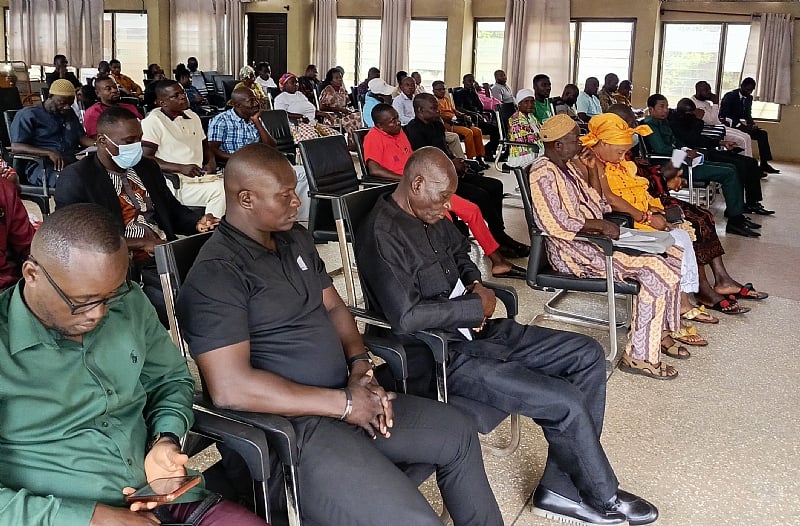The Techiman Municipal Office of Agriculture convened a crucial one-day sensitization program focused on the government’s flagship agricultural initiative, the “Feed Ghana” program. This initiative represents a significant commitment to bolstering food production and security within the municipality and beyond. The program brought together a diverse array of stakeholders, underscoring the collaborative approach necessary for its success. Participants included farmer groups, agro-input dealers, Assembly Members, Agricultural Extension Officers, traditional authorities, queen mothers, religious leaders, community-based organizations (CBOs), and civil society organizations (CSOs). This broad representation ensured that the program’s message reached various segments of the community, fostering a wider understanding of the initiative and its potential impact. The gathering served as a platform to disseminate vital information, address concerns, and encourage active participation in the “Feed Ghana” program.
The program’s core objectives, as outlined by key officials, center on significantly scaling up the production of essential food crops. This enhanced production aims to address both domestic consumption needs and tap into export market opportunities. The specific crops targeted include staples like maize, rice, sorghum, soybeans, cassava, yam, and potatoes. By focusing on these crucial food sources, the “Feed Ghana” program seeks to ensure food security within the region while simultaneously contributing to the national economy through potential export revenue. This dual focus underscores the program’s comprehensive approach to agricultural development. Furthermore, it emphasizes the importance of not only producing enough food but also exploring avenues for economic growth within the agricultural sector.
A critical aspect of the “Feed Ghana” program is its emphasis on farmer organization and registration. Mr. Stephen Aidoo, the Techiman Municipal Director of Agriculture, stressed the importance of farmers forming well-structured and identifiable groups. This organized approach, coupled with proper registration, will facilitate easier recognition and support from the government and relevant agencies. By belonging to established groups, farmers gain access to a network of resources, information, and potential assistance. This structured framework not only streamlines the distribution of support but also empowers farmers to collectively address challenges and advocate for their needs. This emphasis on organization underscores the program’s recognition of the vital role farmers play in the success of the initiative.
Hon. Kwaku Adjei Mensah, the Municipal Chief Executive, highlighted the significance of the “Feed Ghana” program, describing it as a pivotal intervention designed to transform agriculture in the Bono East Region, with a particular focus on Techiman. This initiative, he emphasized, holds the potential to revolutionize agricultural practices, boost production, and improve the livelihoods of those involved in the sector. However, alongside the enthusiasm for the program came a cautionary note. Hon. Mensah warned participants against potential fraudsters who might attempt to exploit the program for personal gain. He emphasized the crucial importance of verifying the credibility of any agricultural initiative before participating, especially those not sanctioned by the Assembly or its departments. This proactive approach aims to protect farmers and other stakeholders from falling prey to fraudulent schemes and ensures that their participation in the program remains secure and beneficial.
Expanding on the scope of agricultural development, the MCE emphasized the importance of diversification. He highlighted that agriculture extends beyond crop production and encompasses animal rearing as well. Encouraging participants to embrace animal husbandry practices, including the rearing of goats, sheep, cattle, and other livestock, the MCE underscored the potential for diversifying income streams and enhancing food security. This integrated approach recognizes the interconnectedness of various agricultural activities and promotes a more holistic view of the sector. By incorporating animal husbandry into their practices, farmers can create more resilient and sustainable livelihoods, reducing their dependence on single crops and diversifying their sources of income. This multifaceted approach strengthens the agricultural sector as a whole and contributes to a more robust and secure food system.
The presence of notable traditional leaders, including Nana Boaffour Oppong II and Nana Yeboaa Asumah III, Atontenhemaa of the Techiman Traditional Area, at the sensitization program underscores the widespread community support for the “Feed Ghana” initiative. Their involvement signifies the recognition of the program’s importance by influential figures within the community and further strengthens its legitimacy. Their presence also reinforces the collaborative nature of the initiative, demonstrating a shared commitment to agricultural development and food security among various stakeholders, including traditional authorities. This united front underscores the program’s potential for achieving its objectives and driving positive change within the agricultural sector. The collective effort of government officials, agricultural experts, community leaders, and farmers themselves lays the foundation for a successful and impactful initiative that promises to transform the agricultural landscape of the region.


